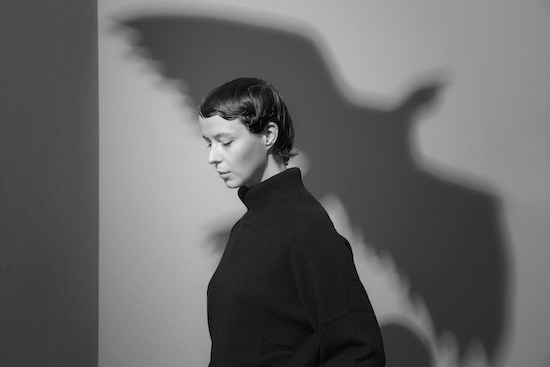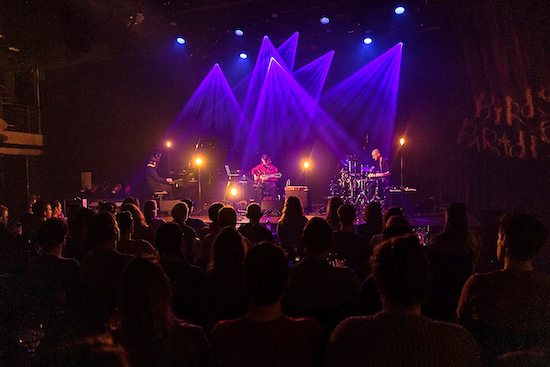This weekend will see the second edition of Birds Of Paradise, an annual event taking place at Utrecht’s TivoliBredenburg and Antwerp’s De Singel.
The four-day festival sees a number of renowned multi-disciplinary artists – each of whom is billed as one of the event’s titular ‘Birds Of Paradise’ – take part in a one-day residency, and present an exclusive performance exclusively for the festival.
The opening night, for instance, will feature a new work by The National’s Bryce Dessner. His performance will feature three concertos, followed by the world premiere of a suite from The Complete Mountain Almanac, a song-cycle by the Norwegian singer-songwriter Rebekka Karijord, whose lyrics were written by Jessica Dessner and, for whom, Bryce Dessner orchestrated the arrangements.
The second ‘Bird Of Paradise’ sees Dutch indie musician Luwten performing new orchestral arrangements of her work with the Belgian Baroque Orchestration X, and the third sees Son Lux (Oscar-nominated for their soundtrack work on Everything Everywhere All At Once) collaborate with experimental vocalist Holland Andrews.
For the final day, pioneering electronic musician Jlin will present chamber music interpretations of her work by Ragazze Quartet and Third Coast Percussion, followed by a DJ set featuring music from her forthcoming album, Akoma. To close the festival, Belgian theatre maker and countertenor Benjamin Abel Meirhaeghe will join forces with the Icelandic producer and composer Valgeir Sigurdsson for a performance focussing on ‘The Art Of Listening’.
Each artist has also been invited to curate a digital Artist Room, filled with materials and curiosities related to their artist vision. You can find them here.
To find out more about the wider philosophy behind Birds Of Paradise, and what we can expect from this year’s festival, tQ caught up with director and curator Frank Veenstra, as well as one of the performers, Luwten, AKA Tessa Douwstra.
What was the original concept behind Birds Of Paradise?
Frank Veenstra: Originally, there was a festival in Zürich called Apples And Olives, and they wanted a satellite festival in The Netherlands. They are also in-between contemporary classical music and indie pop in a manner that I did with another festival called Cross-linx that I ran for 18 years. In the Netherlands, we are more ahead of developments in music, especially in popular music. I thought, I don’t want to make a copy of Cross-linx, [I want to] take the next step, where Cross-linx was really focusing on bringing worlds together.
We’re almost 20 years down the line and there are a lot of artists like Luwten that are already in-between genres. So, I thought, let’s develop a platform that serves those makers. Alongside that, I think it should be more than a music festival. So I also invited them to curate an extensive, ‘context programme’, and that makes it really special. I also hope the audiences really get inside of the world of the artists. That could be about, let’s say, their identity in music, but it could also be [based on] a societal topic.

Luwten
Tessa, how has Frank helped to encourage your artistry as a multidisciplinary artist?
Tessa Douwstra: What I found really fun and interesting in the lead-up to the event, has been being able to not specifically think in terms of music but also in terms of intention. It was just having the opportunity to come to Frank and say: I really like this artist, I’m interested in what she does. For example, we have an evening with a sound artist called Laura Kampman. She makes all these soundscapes from phone recordings. I’ve never been able to book an evening to have other artists on during the night that I’m playing.
FV: What’s nice about the curation of Tessa is that she not only invited people coming from her world, like La Loye, who is a singer-songwriter, but also asked an author to write an essay and someone who works with iPhones and voice memos, which is more in the art world. So I was very pleased with this curation because it’s so diverse and in the same atmosphere as the theme of beginnings.
Why did you pick the theme of ‘beginnings’?
TD: Well, there are a couple of reasons. One of the reasons is that it’s almost spring. I always feel like during this time, we’re all craving that spring moment – it’s been winter for way too long. I wanted to address and celebrate that because I feel very hopeful during this period of time. But I also feel like in the world right now or maybe in general, people are very prone to what is new. I think that’s why we’re all so addicted to beginnings: write a new album, or write a new song. So that’s what I told Bregje [Hofstede]: I wanted to celebrate beginnings, but at the same time we have to move through the beginning to get to the middle part where it becomes interesting. And also, because of March and sowing seeds and plants starting to grow again and all that beautiful natural stuff.
Frank, what can the average festival-goer expect as a whole?
FV: Well, in general, you could say that they all will experience complete new music, either freshly composed or it’s never been heard before in The Netherlands. That’s really the kernel of the festival. I hope that they also will go to our website and enjoy all of the things that they can discover within the Artist Rooms. That’s what really makes it special. Hopefully they return to the website and learn more about the artists after they’ve heard and seen them.
How did you come up with the concept of the Artist Room?
FV: I think Mees [Joachim] came up with it. I was so impressed by what he can do with it technically, but also from an artist’s point of view. He’s very much involved in this kind of music that we present at Birds Of Paradise so it was a perfect fit to have him. He came up with all those wonderful dioramas and ideas that are linked to the topics that the artists brought in. It was so nice that I said, ‘well, let’s make an exhibition on it’. So this year, there will be an exhibition where the avatars are presented in a 3D print, and around that we have large prints of the Artist Rooms.
It sounds like you’re taking the context of the festival from a hyperlocal region into the Internet and making it more global.
FV: Yeah, that’s also something that I find very important, that we have a hybrid programme – so in case coronavirus hits again, we could still have a festival. In the first edition, I had three scenarios: the worst case just online, then semi-online, and live, of course.
Tessa, what can fans expect from your performance at Birds Of Paradise that you can’t do elsewhere?
TD: Since we’re having so many people on stage, it’s going to be interesting not having a guitar in my hands for the entire night. That’s something that I usually can’t do, because I just play with three musicians and we need me on my guitar as well. Also, we’re using quite a lot of electronics normally, but it’s more analogue now because we’re able to play all the stuff I normally sample, or we play on more electronic instruments. And for the entire night, which I haven’t done before, having a writer will give the audience a lens to look through for the entire night. They have this story that she’s telling and everything that will happen on stage will be seen through that lens. So I’m really looking forward to having that experience.
How can festivals nowadays better support artists rather than simply platforming them?
FV: Get in touch with each other and have a conversation about the things that make them tick. Find time to really listen. It’s also an important topic at a festival, and there’s this program called ‘The Art of Listening’.
I think artists and also audiences are more looking for in-depth experiences and not [just] going to the next festival, but really learning more about the artist and about themselves. Like this essay by Bregje Hofstete, I hope it really makes people think and listen. I sent it to my son, who is not in such a good place at the moment mentally. I said, you should read it – you can have a new start, a new beginning.
TD: I like the idea of what we did – have long conversations about the things you’re thinking about. I feel like the artist and the festival, you usually treat each other as some sort of business business arrangement. If you don’t have these conversations, you will get that. You can go to a concert and it’s nice, but there’s a lot of opportunity there when you talk to each other. When festivals and artists talk more, there will be more crazy ideas. And I think the audience doesn’t really know what they want all the time. It’s good to have this conversation and think about how to challenge or surprise people more, instead of just giving them what they already know.
Birds Of Paradise will take place from March 16 to 19, 2023. Find more information here.


